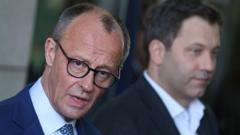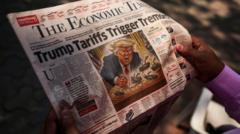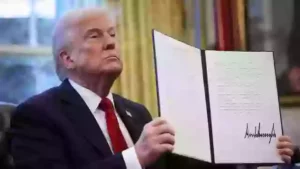After months of political uncertainty, Friedrich Merz's coalition with the Social Democrats promises strategic reforms amidst a backdrop of recession and rising populism.
Germany's Conservatives Reach Coalition Deal with Social Democrats Amid Economic Challenges

Germany's Conservatives Reach Coalition Deal with Social Democrats Amid Economic Challenges
Friedrich Merz announces a new government alliance aimed at tackling pressing economic and migration issues in Germany.
Germany’s conservative party, led by Friedrich Merz, has successfully formed a coalition with the Social Democrats to govern the nation, marking a significant step towards stabilizing Europe’s largest economy after a five-month period of political instability. Merz, who is poised to become chancellor, emphasized that this agreement sends a clear and powerful message about Germany's renewed capability for decisive action, especially as it faces pressing economic challenges and external pressures.
With the backdrop of a German economy already in recession prior to the recent downturn exacerbated by international issues, including US tariffs under former President Donald Trump, Merz conveyed optimism regarding Germany’s recovery trajectory. He stated, "The key message to Donald Trump is Germany is back on track," as he reiterated commitments to boost military spending and enhance the nation’s economic competitiveness.
The urgency to transition out of political limbo was acknowledged given recent electoral outcomes wherein the far-right Alternative for Germany (AfD) began to outpace the Christian Democrats in public support. This coalition agreement, announced during a time of heightened electoral stakes, reflects a broader strategy focused on migration reform, economic initiatives, and defense enhancements. Merz highlighted the intent to implement measures aimed at curbing irregular migration and fortifying Germany's borders, addressing significant voter concerns from the February elections.
Despite criticism from the AfD, claiming the proposed changes lack sufficient rigor, Merz signaled his government’s commitment to substantial investment in military infrastructure. He envisions adopting a “Swedish model” for voluntary military service to strengthen the Bundeswehr as part of this broad defense reform agenda.
Among the notable aspects of this coalition is the retention of Boris Pistorius as the defense minister, ensuring continuity in military leadership despite a largely fresh cabinet composition. Merz described this alliance as the fifth grand coalition in German history, though made it clear that this iteration would strive to embody a distinctive approach compared to its predecessors.
However, some voices on the left, such as prominent politician Sahra Wagenknecht, have argued that the coalition's plans fall short of adequately addressing Germany’s prolonged economic crisis, coining the term "Merzession" to highlight the potential for extended economic downturn.
As the new parliament convenes to elect Merz as chancellor in early May, the coalition’s immediate focus will likely be on navigating these economic challenges while forging a collaborative effort in response to external pressures, particularly from the United States. Current polling indicates Merz’s conservatives trailing slightly behind the AfD, suggesting a precarious political landscape as new governance takes shape.





















